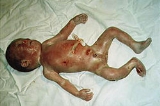
Kurt Hirschhorn
Encyclopedia
Kurt Hirschhorn is an Viennese born American pediatrician, medical geneticist, and cytogeneticist who identified the chromosomal defects that underlie Wolf-Hirschhorn syndrome
.
In 1995, Hirschhorn was the recipient of the William Allan Award
in human medical genetics. He is a fellow of the Hastings Center
, an independent bioethics research institution.
Dr. Kurt Hirschhorn is currently Professor of Pediatrics, Genetics and Genomic Sciences, and Medicine Chairman Emeritus of Pediatrics at the Mount Sinai School of Medicine.
Wolf-Hirschhorn syndrome
Wolf–Hirschhorn syndrome , also known as chromosome deletion 4p syndrome, Pitt-Rogers-Danks syndrome or Pitt syndrome, was first described in 1961 by Americans Herbert L...
.
In 1995, Hirschhorn was the recipient of the William Allan Award
William Allan Award
The William Allan Award, given by the American Society of Human Genetics, was established in 1961 in memory of William Allan , one of the first American physicians to conduct extensive research in human genetics...
in human medical genetics. He is a fellow of the Hastings Center
Hastings Center
The Hastings Center, founded in 1969, is an independent, non-partisan, non-profit bioethics research institute based in the United States. It is dedicated to the examination of essential questions in health care, biotechnology, and the environment...
, an independent bioethics research institution.
Wolf-Hirschhorn syndrome
Wolf-Hirschhorn syndrome (WHS), caused by a chromosomal abnormality, is characterized by typical craniofacial features in infancy consisting of "Greek warrior helmet appearance" of the nose (the broad bridge of the nose continuing to the forehead), microcephaly, high forehead with prominent glabella, ocular hypertelorism, epicanthus, highly arched eyebrows, short philtrum, downturned mouth, micrognathia, and poorly formed ears with pits/tags. All affected individuals have prenatal-onset growth deficiency followed by postnatal growth retardation and hypotonia with muscle under-development. Developmental delay and mental retardation of variable degree is present in all.Dr. Kurt Hirschhorn is currently Professor of Pediatrics, Genetics and Genomic Sciences, and Medicine Chairman Emeritus of Pediatrics at the Mount Sinai School of Medicine.

